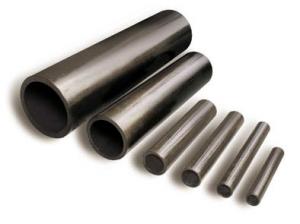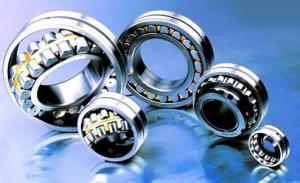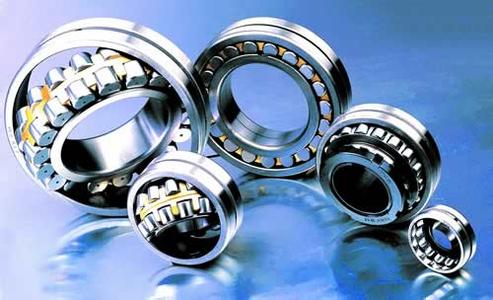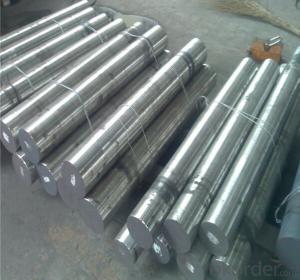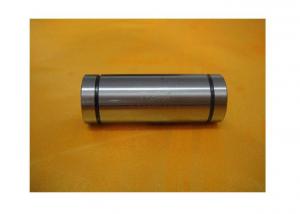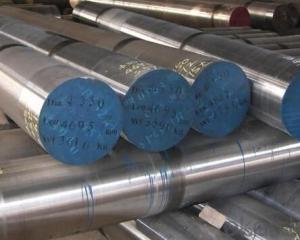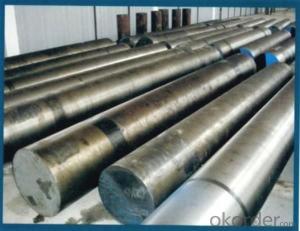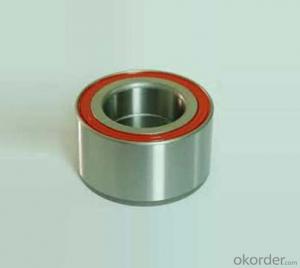Bearing Steel with High Quality
- Loading Port:
- China Main Port
- Payment Terms:
- TT or LC
- Min Order Qty:
- -
- Supply Capability:
- -
OKorder Service Pledge
OKorder Financial Service
You Might Also Like
Product Description:
OKorder is offering Bearing Steelsat great prices with worldwide shipping. Our supplier is a world-class manufacturer of steel, with our products utilized the world over. OKorder annually supplies products to European, North American and Asian markets. We provide quotations within 24 hours of receiving an inquiry and guarantee competitive prices.
Product Applications:
Our products have been used in all kinds of areas, such as aviation, aerospace, navigation, nuclear, energy, chemical industry, electronic information, petrochemical, automotive, instrument and meter, Communication ,transportation, and medical instruments, etc. Bearing ring,steel rolling mill ,machinery, 100Cr6 bearing steel ball is widely used in high-speed and low-noise bearing, bicycle, motorcycle, automobile, bags, electronics.
.
Product Advantages:
OKorder's Bearing Steels are durable, strong, and resist corrosion.
Main Product Features:
· Premium quality
· Prompt delivery & seaworthy packing (30 days after receiving deposit)
· Corrosion resistance
· Can be recycled and reused
· Mill test certification
· Professional Service
· Competitive pricing
Product Specifications:
Grade | AISI 52100, ASTM E52100, DIN 1.3505,JIS SUJ2, GCr15 |
Dimensions | Diameter: 30-60mm Length: 2000-13000mm or as required |
Shape | Round Bar |
Type | Alloy Steel Bar |
Delivery Condition | Black Surface |
Material | Bearing Steel |
Technique | Hot Rolled |
First the famous 1C-1.5Cr steel from which the majority of bearings are made. Its structure is apparently well-understood and the focus is on purity in order to avoid inclusions which initiate fatigue during rolling contact. Then there is the M50 steel and its variants, from which bearings which serve at slightly higher temperatures in aeroengines are manufactured, based on secondary-hardened martensite.
Tapered roller bearing are generally used to support combined load mainly consisting of radial load. Their cups are separable for easy assembling ,During mounting and using, radial clearance and axial clearance can be adjusted and preloaded mounting can be made.
FAQ:
Q1: Why buy Materials & Equipment from OKorder.com?
A1: All products offered byOKorder.com are carefully selected from China's most reliable manufacturing enterprises. Through its ISO certifications, OKorder.com adheres to the highest standards and a commitment to supply chain safety and customer satisfaction.
Q2: How do we guarantee the quality of our products?
A2: We have established an advanced quality management system which conducts strict quality tests at every step, from raw materials to the final product. At the same time, we provide extensive follow-up service assurances as required.
Q3: How soon can we receive the product after purchase?
A3: Within three days of placing an order, we will begin production. The specific shipping date is dependent upon international and government factors, but is typically 7 to 10 workdays.
Images:
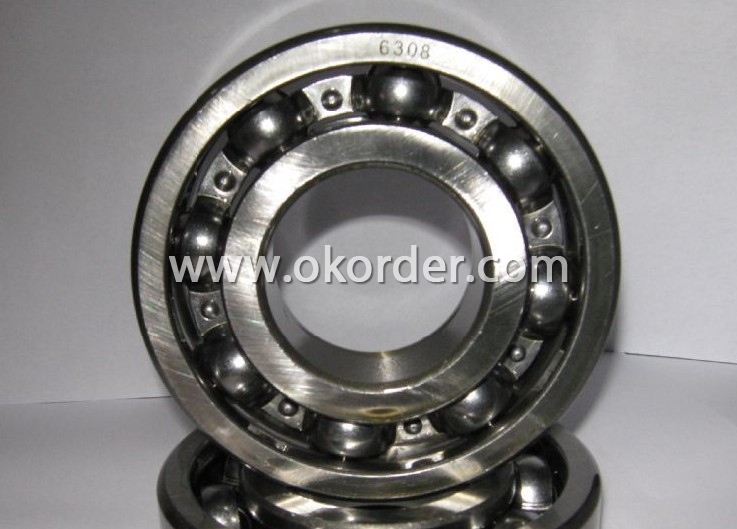
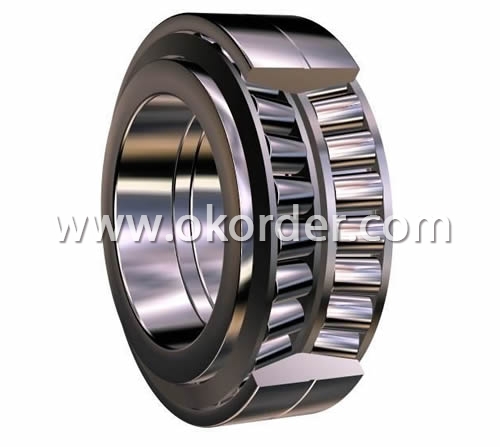
- Q: Can special steel be used in the appliance manufacturing industry?
- Yes, special steel can be used in the appliance manufacturing industry. Special steels, such as stainless steel or high-strength steel, offer various advantages such as corrosion resistance, durability, and enhanced mechanical properties. These qualities make them suitable for manufacturing appliances that require high performance, such as refrigerators, ovens, or washing machines. Additionally, special steels can be customized to meet specific design requirements and can contribute to the overall aesthetic appeal of the appliances.
- Q: What are the different methods of joining special steel?
- There are several methods of joining special steel, including welding, brazing, soldering, and mechanical fastening. Welding involves melting and fusing the steel pieces together using heat, while brazing and soldering use a filler metal with lower melting points to join the steel. Mechanical fastening methods, such as bolting or riveting, rely on physical connections to hold the steel pieces together without altering their properties. Each method has its own advantages and limitations, and the choice depends on factors such as the type of steel, the desired strength, and the specific application.
- Q: What are the specific requirements for special steel used in the nuclear fuel industry?
- The specific requirements for special steel used in the nuclear fuel industry are stringent and demanding. These requirements are necessary to ensure the safety and reliability of nuclear power plants. Here are some of the key specifications for special steel used in this industry: 1. High temperature resistance: Special steel used in the nuclear fuel industry must be able to withstand high temperatures without losing its structural integrity. This is crucial as nuclear reactors generate extreme heat during operation. 2. Corrosion resistance: Nuclear fuel environments can be highly corrosive due to the presence of hot and pressurized water, radiation, and chemical reactions. Special steel used in the industry must have exceptional corrosion resistance to prevent degradation and maintain safety. 3. Radiation resistance: The nuclear fuel industry involves exposure to radiation. Special steel needs to have excellent resistance to radiation damage and embrittlement to ensure long-term structural integrity and prevent any risk of failure. 4. High strength and toughness: Special steel used in the nuclear fuel industry should possess high strength and toughness to withstand the extreme conditions experienced within a nuclear reactor. This ensures that the steel can withstand the pressure and stress exerted on it during reactor operation. 5. Low neutron absorption: Neutron absorption is a critical factor in nuclear reactors. Special steel used in the industry should have low neutron absorption properties to prevent interference with the nuclear reactions and to maintain reactor efficiency. 6. Strict quality control and traceability: The manufacturing and fabrication of special steel for the nuclear fuel industry must adhere to stringent quality control procedures to ensure consistency and reliability. Traceability is also crucial to identify the origin and history of the steel, allowing for comprehensive inspections and assessments. Meeting these specific requirements is essential for the safe and efficient operation of nuclear power plants. Special steel used in the nuclear fuel industry must undergo rigorous testing, certification, and quality control processes to ensure its compliance with these stringent specifications.
- Q: How does special steel perform in casting applications?
- Special steel performs well in casting applications due to its high strength, excellent heat resistance, and good corrosion resistance. These properties make it suitable for casting complex shapes and handling high temperatures, ensuring superior performance and durability in various industries such as automotive, aerospace, and energy.
- Q: What are the specific requirements for special steel used in the mining drill bit industry?
- The mining drill bit industry has specific requirements for the special steel it utilizes, which focus on durability, toughness, and resistance to wear and corrosion. To begin with, the steel employed in mining drill bits must possess exceptional durability to endure the harsh and demanding conditions found in the mining environment. The drill bits are exposed to high levels of impact, vibration, and stress, necessitating high strength and hardness in the steel to prevent deformation or breakage. Moreover, toughness plays a crucial role in drill bit steel as it must withstand the repetitive and intense forces encountered during drilling operations. The steel should exhibit good fracture toughness to resist crack propagation and prevent premature failure. Additionally, wear resistance is of utmost importance for drill bit steel, as it must retain its cutting edge and performance over long periods. The steel needs to have high wear resistance to withstand the abrasive nature of the rocks and minerals being drilled. Furthermore, apart from wear resistance, the steel utilized in mining drill bits must also demonstrate resistance to corrosion. The mining environment often involves exposure to water, chemicals, and various corrosive agents. Hence, the steel should possess suitable corrosion resistance properties to prevent rusting and degradation. In conclusion, the special steel employed in the mining drill bit industry must fulfill these specific requirements of durability, toughness, wear resistance, and corrosion resistance to ensure reliable and efficient drilling operations in the mining sector.
- Q: Can special steel be used in cryogenic applications?
- Indeed, cryogenic applications can utilize special steel. In particular, austenitic stainless steels like 304 or 316 are frequently employed in cryogenic settings because of their remarkable mechanical attributes and ability to withstand low temperatures. These steels maintain their strength, toughness, and ductility even in exceedingly cold environments, rendering them suitable for cryogenic use. Furthermore, special steels also exhibit commendable resistance to corrosion and thermal expansion, which are crucial considerations in cryogenic applications. In summary, special steel alloys possess a distinctive combination of properties that make them highly suitable for withstanding and functioning in extremely frigid conditions.
- Q: What is the role of special steel in the construction industry?
- Special steel plays a crucial role in the construction industry as it provides enhanced strength, durability, and resistance to corrosion. It is commonly used in the construction of high-rise buildings, bridges, and infrastructure projects, where structural integrity is crucial. Special steel's unique properties enable it to withstand extreme conditions and heavy loads, ensuring the safety and longevity of construction projects. Additionally, its versatility allows for the fabrication of various components, such as beams, columns, and reinforcement bars, making it an indispensable material in the construction industry.
- Q: What are the different machining techniques for special steel?
- There are several different machining techniques that can be used for special steel, depending on the specific requirements and characteristics of the steel. Some common machining techniques for special steel include turning, milling, drilling, grinding, and broaching. Each technique has its own advantages and is used to achieve different results, such as shaping the steel, removing material, or creating precise cuts and finishes. The choice of machining technique will depend on factors such as the desired outcome, the hardness and toughness of the steel, and the complexity of the part being machined.
- Q: What are the main characteristics of high-speed steel forgings?
- High-speed steel forgings possess several key characteristics that make them highly desirable in various industries. Firstly, high-speed steel forgings exhibit exceptional hardness and wear resistance. This is due to their composition, which typically includes elements such as tungsten, molybdenum, chromium, and vanadium. These elements form hard carbides within the steel matrix, resulting in a material that can withstand high temperatures and resist abrasion and deformation. Secondly, high-speed steel forgings have excellent heat resistance. This allows them to maintain their hardness and strength even at elevated temperatures, which is crucial in applications where tools or components are subjected to intense heat during operation. Another important characteristic of high-speed steel forgings is their ability to retain their cutting edge for extended periods. This is particularly advantageous in cutting tools, where a sharp edge is crucial for efficient and accurate machining. The high hardness of the steel ensures that the cutting edge remains sharp, resulting in improved tool life and performance. Furthermore, high-speed steel forgings have good toughness and impact resistance. This makes them less susceptible to cracking or chipping under heavy loads or sudden impacts, ensuring their durability and reliability in demanding applications. In addition to these mechanical properties, high-speed steel forgings also have excellent machinability. They can be easily shaped, formed, and machined into complex geometries, making them ideal for producing intricate components or tools. Overall, the main characteristics of high-speed steel forgings include exceptional hardness, wear resistance, heat resistance, cutting edge retention, toughness, impact resistance, and machinability. These qualities make them highly sought-after in industries such as aerospace, automotive, tooling, and machining, where performance, reliability, and longevity are crucial.
- Q: How is special steel used in the mining supply chain?
- Special steel is used in various components and equipment used in the mining supply chain. It is commonly used in the construction of heavy machinery, such as mining trucks, excavators, and drilling rigs, as well as in the fabrication of conveyor belts and crushing equipment. Additionally, special steel is utilized in the production of wear-resistant parts, such as grinding balls and liners, which are crucial for efficient ore processing. Its exceptional strength, durability, and resistance to extreme conditions make it an essential material in the mining industry, ensuring safe and efficient operations throughout the supply chain.
Send your message to us
Bearing Steel with High Quality
- Loading Port:
- China Main Port
- Payment Terms:
- TT or LC
- Min Order Qty:
- -
- Supply Capability:
- -
OKorder Service Pledge
OKorder Financial Service
Similar products
Hot products
Hot Searches
Related keywords
